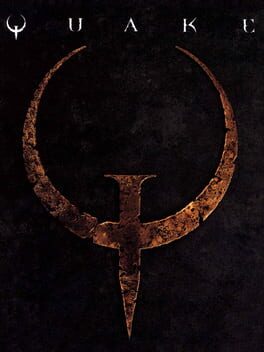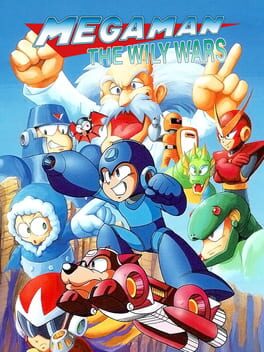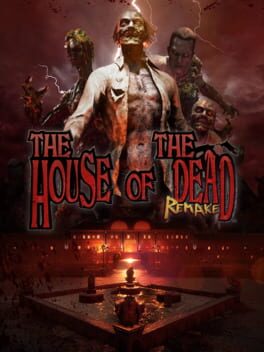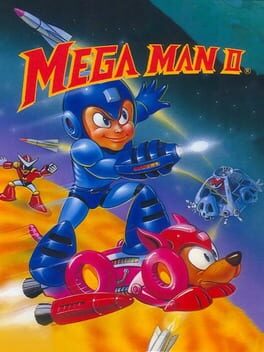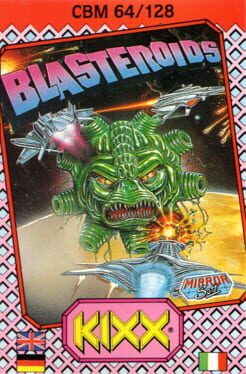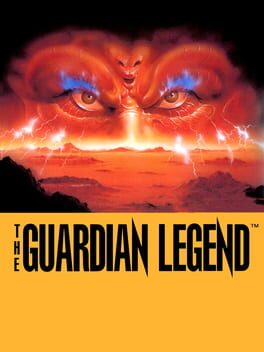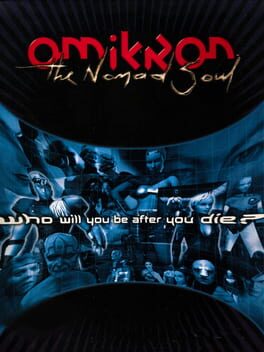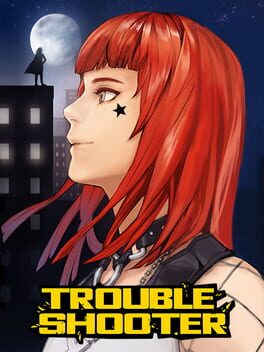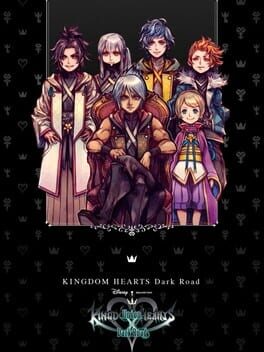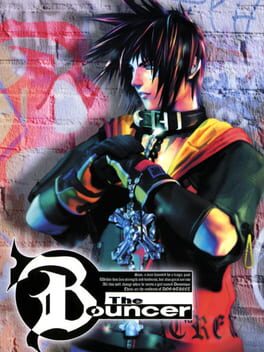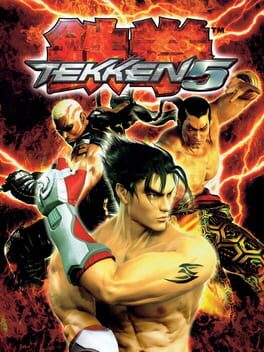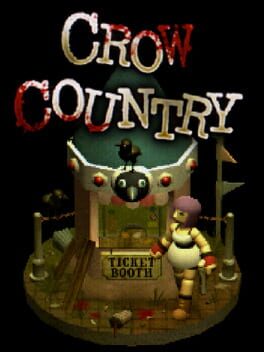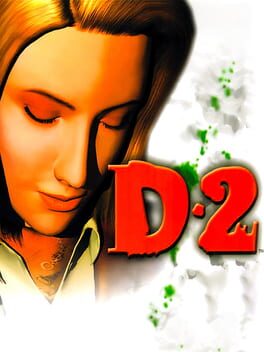Demi
BACKER
425 Reviews liked by Demi
Quake
1996
One of the earliest FPS in a full 3D environment, so of course it's groundbreaking! Being able to run over bridges, walk above and under each other, look up and down... even just JUMPING was considered pretty new and exciting thing to do in the genre to some players, especially for someone coming straight from Doom. Other games helped intergrate some of these things earlier than Quake, but Quake brought it all together and actually put it in a fully-3D environment rather than trying to emulate one.
The story is fun, and seems to be filled with the classic terror and suspense that FPS are so great for. The gun variety is fun to play around with, and the environments of all the chapters are pretty unique compared to eachother, playing with water, bridges, portals, and all that to help contrast one another. The thing that really makes Quake standout, in my opinion, is its 8-player online multiplayer option. The closest thing I can personally compare it to from before its release is Doom's deathmatch, but Quake's 3D environments and four additional battlemates makes it close to impossible to return to Doom. Of course, in the modern day, I could just go on Fortnite and play a shooter online against 99 random people (and I do!), but in comparison to what was available at the time, Quake was monumental. Here I am almost 30 years later still having a blast with my friend (Hi Roxy!!) trying to shoot each others faces off and grab the lightning gun before the other can attack with it first.
Check out Quake for a good boomer-shooter and a fun piece of gaming history. If you can gather seven friends, you'll have a hell of a good time.
4/5
The story is fun, and seems to be filled with the classic terror and suspense that FPS are so great for. The gun variety is fun to play around with, and the environments of all the chapters are pretty unique compared to eachother, playing with water, bridges, portals, and all that to help contrast one another. The thing that really makes Quake standout, in my opinion, is its 8-player online multiplayer option. The closest thing I can personally compare it to from before its release is Doom's deathmatch, but Quake's 3D environments and four additional battlemates makes it close to impossible to return to Doom. Of course, in the modern day, I could just go on Fortnite and play a shooter online against 99 random people (and I do!), but in comparison to what was available at the time, Quake was monumental. Here I am almost 30 years later still having a blast with my friend (Hi Roxy!!) trying to shoot each others faces off and grab the lightning gun before the other can attack with it first.
Check out Quake for a good boomer-shooter and a fun piece of gaming history. If you can gather seven friends, you'll have a hell of a good time.
4/5
An interesting way to replay the original trilogy of NES MegaMan games but not a replacement for them.
Not quite sure how to put it into words but this game has this sort of Genesis grit to it when it comes to its visuals that I don't really think fits with the original trilogy's art style/aesthetic (not saying it's necessarily a bad thing, just not fitting). Same goes for the music, it's good but like in a "oh this is a neat different take" on these tracks rather than an improvement due to the Genesis's sound. There's also issues with slow-down at certain points in the game.
All of that may sound bad but this is still a pretty cool collection and a neat way to replay all the games if you've played them all like 100 times before and need a way to spice it up. And its special edition of Wily Tower is one of the coolest features in a MegaMan game.
Not quite sure how to put it into words but this game has this sort of Genesis grit to it when it comes to its visuals that I don't really think fits with the original trilogy's art style/aesthetic (not saying it's necessarily a bad thing, just not fitting). Same goes for the music, it's good but like in a "oh this is a neat different take" on these tracks rather than an improvement due to the Genesis's sound. There's also issues with slow-down at certain points in the game.
All of that may sound bad but this is still a pretty cool collection and a neat way to replay all the games if you've played them all like 100 times before and need a way to spice it up. And its special edition of Wily Tower is one of the coolest features in a MegaMan game.
Mega Man II
1991
Blasteroids
1987
Animal Well
2024
Animal Well is Rain World remembering games are supposed to be fun :P
Joking aside, beyond some shared ambiance, taciturnity, and tonal progression, the two games are drastically different.
For one, Animal Well is all about the standalone screen. With the exception of one foe (whose presence is entirely your own choice), no enemies will follow you beyond the edges of each room. In fact, poke your head back from where you just fled and you'll find your carnivorous pursuer has respawned to the other side of the room. This is nothing like the persistent lizards and vultures of Rain who will unfairly snap you up at the boundary of your monitor -- but I honestly can't tell you which is better. Their divergent treatments of their separate realities are two-edged swords in exactly opposite ways.
For two, I was far more willing to put up with the Well bullshit than I ever was with Rain. Reaching the end of the crapsack-slugcat journey was a relief rather than a celebration. Yet despite my constant enjoyment of Well's layered secrets (I can't recall the last time I had such desire to 100% complete a game), in the end I found myself wanting more resolution from its non-endings than it was willing to give. The mystery of the Well, with its motley fauna and their unexplained monuments, was intriguing, but never added up to anything thematic or meaningful. It's simply a vibe. Perhaps that's all it needs to be?
It's odd that I enjoy this more than Fez, a similar meta-puzzle game with layers upon layers and a pretense to the themes of 2001: Space Odyssey. Yet despite my annoyance with the areligious religiosity of Fez, at least it tries to say something. Well copies some of the quasi-scientific-dimensional musings of Phil Fish but more out of seeming obligation than genuine interest. "This is what meta-puzzlers do," developer Basso silently admits.
I give Animal Well high esteem for its devotion to video-game-speak. No tutorials, no dialogue, no loading-screen-tips -- just you and the game and its tools. It was a genuine thrill to find the tools' various uses and unearth secrets across its world. Its consistent 'telos' of discovery puts it in close proximity with the original Legend of Zelda, and there are few forms of higher praise I could give than that.
Nonetheless, like the game I first compared it to, I'm having trouble giving it a score. So it shall remain without such.
Joking aside, beyond some shared ambiance, taciturnity, and tonal progression, the two games are drastically different.
For one, Animal Well is all about the standalone screen. With the exception of one foe (whose presence is entirely your own choice), no enemies will follow you beyond the edges of each room. In fact, poke your head back from where you just fled and you'll find your carnivorous pursuer has respawned to the other side of the room. This is nothing like the persistent lizards and vultures of Rain who will unfairly snap you up at the boundary of your monitor -- but I honestly can't tell you which is better. Their divergent treatments of their separate realities are two-edged swords in exactly opposite ways.
For two, I was far more willing to put up with the Well bullshit than I ever was with Rain. Reaching the end of the crapsack-slugcat journey was a relief rather than a celebration. Yet despite my constant enjoyment of Well's layered secrets (I can't recall the last time I had such desire to 100% complete a game), in the end I found myself wanting more resolution from its non-endings than it was willing to give. The mystery of the Well, with its motley fauna and their unexplained monuments, was intriguing, but never added up to anything thematic or meaningful. It's simply a vibe. Perhaps that's all it needs to be?
It's odd that I enjoy this more than Fez, a similar meta-puzzle game with layers upon layers and a pretense to the themes of 2001: Space Odyssey. Yet despite my annoyance with the areligious religiosity of Fez, at least it tries to say something. Well copies some of the quasi-scientific-dimensional musings of Phil Fish but more out of seeming obligation than genuine interest. "This is what meta-puzzlers do," developer Basso silently admits.
I give Animal Well high esteem for its devotion to video-game-speak. No tutorials, no dialogue, no loading-screen-tips -- just you and the game and its tools. It was a genuine thrill to find the tools' various uses and unearth secrets across its world. Its consistent 'telos' of discovery puts it in close proximity with the original Legend of Zelda, and there are few forms of higher praise I could give than that.
Nonetheless, like the game I first compared it to, I'm having trouble giving it a score. So it shall remain without such.
The Guardian Legend
1988
The age old question in NES gaming always seems to be “Is The Guardian Legend a hidden gem?” The phrase "hidden gem" seems to be made fun of more than used as an actual discussion point, but it's interesting to talk about! Was a game from almost 40 years a bit shafted over something else? Was the game ignored for good reason or did it get its limelight taken away because of some unknown factor? I bought Guardian Legend at a convention because my friend Zack said he’s really interested in looking at it as it mixed two different genres. Later, my friend Frank let me know that it’s one of the earliest video games to have a visibly female protagonist. I thought that was interesting, so I moved it to the front of my “backlog” and found out from there that the game had a bit of a reputation with old school gamers. Why exactly? Why, because of that darn sparkling jewel that this game seems to be, of course! That’s all I knew before I went in, so my expectations were pretty nonexistent.
When the Guardian Legend came out, it didn’t seem to make much of a ripple in either the West or the East. It is apparently a sequel to an MSX game called "Guardic". The Guardian Legend is a very unique combination of a shmup and a sort of overworld Zelda-esque action game, making it one of the earlier examples of mixing genres and still having it work. Both Western and Eastern audiences gave it mixed reviews, with some saying its combining of genres results in both aspects (shooting and overworld) being a bit meh, when focusing on just one genre would have made a stronger game. Others liked the mix and saw it as something future shmups might catch onto.. Overall, it seems like the Guardian Legend was a bit overlooked when it first came out, but was definitely not hated, with it getting an average rating of 75 out of 100. It was something that came and faded into history.
Well, how about my opinion? This is my review after all! Do I think the game deserved more attention? I think the mixed general opinion is a valid one, especially if someone bought the Guardian Legend looking for a shoot 'em up. The game is fun, and definitely unique for the NES, but the gameplay is not remotely challenging, and a lot of the final bosses are just recolors, which can understandably be a little annoying. I personally found the mix of genres fun, as I’ve never played anything like it on the NES before. I found the Guardian Legend really hard to put down actually! It had a really nice flow, with you discovering puzzles and secrets, leveling up your abilities, and finding the dungeons. The dungeons themselves are the shmup section, and are a nice way to keep you interested. It helps switch things up from the overworld.
I personally really, really loved the Guardian Legend, but I can understand it not being for everyone, especially those looking for something that’s solely a shoot ‘em up. I’m sad it wasn’t more popular to get a sequel, because I think it would have been an especially fun concept with the SNES’s gorgeous graphics and additional buttons. Even on the NES, the Guardian Legend looks amazing! In my personal opinion, the Guardian Legend is absolutely one of my favorite games on the NES that I’ve played yet, and if you’re a fan of 3rd-generation gaming, you should do yourself a favor and seek it out, as sadly this treasure was buried a little deep.
4/5
When the Guardian Legend came out, it didn’t seem to make much of a ripple in either the West or the East. It is apparently a sequel to an MSX game called "Guardic". The Guardian Legend is a very unique combination of a shmup and a sort of overworld Zelda-esque action game, making it one of the earlier examples of mixing genres and still having it work. Both Western and Eastern audiences gave it mixed reviews, with some saying its combining of genres results in both aspects (shooting and overworld) being a bit meh, when focusing on just one genre would have made a stronger game. Others liked the mix and saw it as something future shmups might catch onto.. Overall, it seems like the Guardian Legend was a bit overlooked when it first came out, but was definitely not hated, with it getting an average rating of 75 out of 100. It was something that came and faded into history.
Well, how about my opinion? This is my review after all! Do I think the game deserved more attention? I think the mixed general opinion is a valid one, especially if someone bought the Guardian Legend looking for a shoot 'em up. The game is fun, and definitely unique for the NES, but the gameplay is not remotely challenging, and a lot of the final bosses are just recolors, which can understandably be a little annoying. I personally found the mix of genres fun, as I’ve never played anything like it on the NES before. I found the Guardian Legend really hard to put down actually! It had a really nice flow, with you discovering puzzles and secrets, leveling up your abilities, and finding the dungeons. The dungeons themselves are the shmup section, and are a nice way to keep you interested. It helps switch things up from the overworld.
I personally really, really loved the Guardian Legend, but I can understand it not being for everyone, especially those looking for something that’s solely a shoot ‘em up. I’m sad it wasn’t more popular to get a sequel, because I think it would have been an especially fun concept with the SNES’s gorgeous graphics and additional buttons. Even on the NES, the Guardian Legend looks amazing! In my personal opinion, the Guardian Legend is absolutely one of my favorite games on the NES that I’ve played yet, and if you’re a fan of 3rd-generation gaming, you should do yourself a favor and seek it out, as sadly this treasure was buried a little deep.
4/5
Troubleshooter: Abandoned Children really absorbed my life for a while, which is both a good and bad thing relating to this game. The game really draws you in with an addictive looter game cycle with XCOM style gameplay and impressive art all throughout. However, the further you get into the game, the more the cracks begin to show which ultimately crumbles apart come the DLCs that drag this game down unless you are the most diehard fan.
The world of Troubleshooter is quite interesting with a lot of thought put into its setting and lore to setup the main story of the game. From rich politics, interesting science fiction ideas, and an interconnected web of characters related through circumstance and various organizations, there is a lot to delve into here. The story follows a set of vigilante heroes who work through contracts with the government as they build up their ragtag team of "Troubleshooters" to solve crimes and help civilians wherever they can despite the police's incompetence. With gorgeous art, and a fairly competent soundtrack, the visual novel segments in theory should be excellent. However, this is where we get our first few problems. The translation of this game is very poor, to the point where even important UI elements are all labeled incorrectly with certain materials having the wrong names. It appears as though the game was machine translated, or translated by a single person from the original language to English, which poorly impacts the script. The starting villains leave a lot to be desired with the spoonists appearing far more silly than they are actually meant to be taken compared to future villains which just feel more reasonable and have more going for them. Furthermore, the actual mode of storytelling leaves a lot to be desired, relying on flashbacks far too frequently to tell the story making it hard to be too invested in the now. Especially as this leads into the poor pacing of the game itself.
Everything in this game leads into the game cycle, which feels like a skinnerbox intended for the most hardcore Diablo players, with even normal mode being a challenge toward the end of the game without excessive grinding and new builds. As said before, the game is like XCOM except with the twist that its more about your individual heroes on a team with superpowers and an in-depth job system with looting mechanics to derive each character's stats. Right away this gripped me and kept its grip in me until the end of the game, moreso than XCOM ever did, but in that is where problems form. While early game builds are easy to create and are very enjoyable to do, once the late game hits the micromanaging of units becomes quite overwhelming and at times very hard to keep up with in order to ensure that your team isn't getting one-shot by the enemies having ridiculously good builds even just on normal difficulty. Each character plays uniquely and its fun seeing what the excel in, creating mastery builds using the game's job system. The player finds masteries from defeating enemies, can research them, and equip them as skills to each party member with a variety of effects and some that are limited to classes. This allows for incredibly diverse builds, such as making the main character a counter attack machine that is able to block and dodge most attacks before delivering devastating counter attacks to enemies. This is made even better as sets of 4 masteries can create mastery sets if you select the right ones with the ability to experiment to see which ones work, to further increase your combat capabilities such as having a number of electric abilities that synergize for Sion to allow him to stun enemies and do massive damage. This is addictive, but also where the game falls hard in the late game, as the difficulty spike in the last few missions is intense, and I suspect as this game was similar to a live service game was intended to keep players hooked and playing longer in order to grind until the next update. Playing it all at once when all updates are available and all DLC is available makes this grind quite excruciating, even for someone who was replaying levels to minmax early on. When paired with the excessive flashbacks and long story segments between missions, we start to see a trend.
The game likes to waste the player's time a lot. During many missions the player is given control of a lot of unnamed police units to control to make up for the enemy units coming in high volumes. While the player is capable of setting these units to be automized, they cannot do the same for their own characters making each chapter longer than the last as there are more characters that need to be controlled as time goes on. At the start, I thought that later on there would be less VHPD officers in missions, and they were only present at the start of the game, but this is wrong, even late game DLC missions will still have the player controlling a dozen of the VHPD officers which gets to be a lot when by the end of the DLC you have 12 other units to control, not even counting trained beasts and drones that the player can summon in battle. There are just too many units and this draws out battles considerably compared to early game ones, which feels painful when progression in the game for crucial gameplay mechanics are locked behind very slow mission progression, to even get the second party member and improved storage the player has to do a surprising amount of missions not even getting into drone building and beast taming that come up very late. XCOM did a number of tactics to avoid scenarios like this, but Troubleshooter embraces it for story purposes, since it very much wants the scale of these fights to be massive and you to unlock things when it is story relevant, which I do appreciate in a certain respect, but in another its excessive and wastes too much time on levels that could have been half the length. Especially for the DLC stages that can be extremely large and due to their difficulty require numerous attempts.
The difficulty of this game falls apart during the DLC. Many stages are set up in an experimental way which allows for very fun and interesting levels even in the SRPG genre, but it also makes some of the most difficult ones as it feels like the new DLC masteries and equipment were duct taped onto the existing game instead of being incorporated naturally. As mastery slots open up to level 50, I was expecting more slots to unlock up to level 60 with the DLC, but this is not the case, instead the player has to use a number of Masteries to expand their maximum property values in the DLC which just adds another pointless form of grinding to get these sets for everyone to be competitive, especially when considering that these sets don't even give more slots, they just give more points that can be put into each slot. Effectively making the progression feel horizontal even though it is very slightly making your characters stronger, where this slight progress is necessary to not be completely destroyed by the enemies. Come certain segments of the DLC, certain units will be useless at different points. The start of Black Witch and White Lion makes insanely strong melee units that destroy your ranged units due to their abilities, only for the end of the DLC to make sniping units the new kings of the jungle who wipe out entire squads in seconds. Crimson Crow is especially egregious with how melee units are practically made useless in some maps as the enemy ranger techniques are so busted that a melee unit sneezing near them will allow 4 units to attack your melee unit at the same time while inflicting armorbreak and marking. At this point in the game its completely acceptable to turn it to easy mode if you just want to finish the story.
And the story does finish... In an unsatisfying way. Each DLC has cliffhangers and largely just leads into the next segment of the game. Troubleshooter: Abandoned Children doesn't particularly have a solidified or real ending with a sense of finality. There are small end chapters that conclude one plot point of a myriad, but it always leaves more which is in line with the live service model it was going for. But now that those updates are done with the team working on the sequel, it leaves things feeling empty.
Its painful as I do find the characters enjoyable, I do enjoy the story for what its worth even with all my criticisms early and feeling the desire to skip numerous times when I had gotten a flashback for 10 years ago that went into a flashback for 8 years ago that went into a flashback from 2 years ago that went into a flashback from 5 years ago, just to lead into a final scene where we see the character say a single line before moving onto the next mission. I'd say a lot of the love I have for the story comes from the ridiculous amount of CGs that are for every scene, with unique portraits depending on what the characters are wearing in the scene, and sometimes even just specific emotions. The amount of portraits and CGs in this game is incredible and tells so much emotion behind each picture that it tells the story in its own way even with the lacking poorly translated prose. I WANT to love this game, but its not quite where it needs to be.
And, in a lot of ways, I loved this game, but I also hated it at a lot of points too. Troubleshooter is a game that the player should be going into with the right mindset, the player should know that they can have over 200 hours of gameplay of looting and enjoyable grinding, they should go in knowing that progression takes far too long, and to embrace the slow ride. Trying to speedrun this game is a nightmare and should never be done, play it for a month here and there like you would a free to play game, pick it up and drop it like an infinitely playable game like Stardew Valley, but don't rush it or you'll be beating your head against the wall. Know what you're getting into, and if this game sounds up your alley, give it a shot since there is a lot of passion and heart in here from a small studio that did a very impressive job all things considered. I was amazed with the online connectivity, the overall amount of content in this game, and the relative lack of bugs and it cannot go understated how good this team is given their small size, which makes me look forward to their future projects. Troubleshooter: Abandoned Children gets a 3/5.
The world of Troubleshooter is quite interesting with a lot of thought put into its setting and lore to setup the main story of the game. From rich politics, interesting science fiction ideas, and an interconnected web of characters related through circumstance and various organizations, there is a lot to delve into here. The story follows a set of vigilante heroes who work through contracts with the government as they build up their ragtag team of "Troubleshooters" to solve crimes and help civilians wherever they can despite the police's incompetence. With gorgeous art, and a fairly competent soundtrack, the visual novel segments in theory should be excellent. However, this is where we get our first few problems. The translation of this game is very poor, to the point where even important UI elements are all labeled incorrectly with certain materials having the wrong names. It appears as though the game was machine translated, or translated by a single person from the original language to English, which poorly impacts the script. The starting villains leave a lot to be desired with the spoonists appearing far more silly than they are actually meant to be taken compared to future villains which just feel more reasonable and have more going for them. Furthermore, the actual mode of storytelling leaves a lot to be desired, relying on flashbacks far too frequently to tell the story making it hard to be too invested in the now. Especially as this leads into the poor pacing of the game itself.
Everything in this game leads into the game cycle, which feels like a skinnerbox intended for the most hardcore Diablo players, with even normal mode being a challenge toward the end of the game without excessive grinding and new builds. As said before, the game is like XCOM except with the twist that its more about your individual heroes on a team with superpowers and an in-depth job system with looting mechanics to derive each character's stats. Right away this gripped me and kept its grip in me until the end of the game, moreso than XCOM ever did, but in that is where problems form. While early game builds are easy to create and are very enjoyable to do, once the late game hits the micromanaging of units becomes quite overwhelming and at times very hard to keep up with in order to ensure that your team isn't getting one-shot by the enemies having ridiculously good builds even just on normal difficulty. Each character plays uniquely and its fun seeing what the excel in, creating mastery builds using the game's job system. The player finds masteries from defeating enemies, can research them, and equip them as skills to each party member with a variety of effects and some that are limited to classes. This allows for incredibly diverse builds, such as making the main character a counter attack machine that is able to block and dodge most attacks before delivering devastating counter attacks to enemies. This is made even better as sets of 4 masteries can create mastery sets if you select the right ones with the ability to experiment to see which ones work, to further increase your combat capabilities such as having a number of electric abilities that synergize for Sion to allow him to stun enemies and do massive damage. This is addictive, but also where the game falls hard in the late game, as the difficulty spike in the last few missions is intense, and I suspect as this game was similar to a live service game was intended to keep players hooked and playing longer in order to grind until the next update. Playing it all at once when all updates are available and all DLC is available makes this grind quite excruciating, even for someone who was replaying levels to minmax early on. When paired with the excessive flashbacks and long story segments between missions, we start to see a trend.
The game likes to waste the player's time a lot. During many missions the player is given control of a lot of unnamed police units to control to make up for the enemy units coming in high volumes. While the player is capable of setting these units to be automized, they cannot do the same for their own characters making each chapter longer than the last as there are more characters that need to be controlled as time goes on. At the start, I thought that later on there would be less VHPD officers in missions, and they were only present at the start of the game, but this is wrong, even late game DLC missions will still have the player controlling a dozen of the VHPD officers which gets to be a lot when by the end of the DLC you have 12 other units to control, not even counting trained beasts and drones that the player can summon in battle. There are just too many units and this draws out battles considerably compared to early game ones, which feels painful when progression in the game for crucial gameplay mechanics are locked behind very slow mission progression, to even get the second party member and improved storage the player has to do a surprising amount of missions not even getting into drone building and beast taming that come up very late. XCOM did a number of tactics to avoid scenarios like this, but Troubleshooter embraces it for story purposes, since it very much wants the scale of these fights to be massive and you to unlock things when it is story relevant, which I do appreciate in a certain respect, but in another its excessive and wastes too much time on levels that could have been half the length. Especially for the DLC stages that can be extremely large and due to their difficulty require numerous attempts.
The difficulty of this game falls apart during the DLC. Many stages are set up in an experimental way which allows for very fun and interesting levels even in the SRPG genre, but it also makes some of the most difficult ones as it feels like the new DLC masteries and equipment were duct taped onto the existing game instead of being incorporated naturally. As mastery slots open up to level 50, I was expecting more slots to unlock up to level 60 with the DLC, but this is not the case, instead the player has to use a number of Masteries to expand their maximum property values in the DLC which just adds another pointless form of grinding to get these sets for everyone to be competitive, especially when considering that these sets don't even give more slots, they just give more points that can be put into each slot. Effectively making the progression feel horizontal even though it is very slightly making your characters stronger, where this slight progress is necessary to not be completely destroyed by the enemies. Come certain segments of the DLC, certain units will be useless at different points. The start of Black Witch and White Lion makes insanely strong melee units that destroy your ranged units due to their abilities, only for the end of the DLC to make sniping units the new kings of the jungle who wipe out entire squads in seconds. Crimson Crow is especially egregious with how melee units are practically made useless in some maps as the enemy ranger techniques are so busted that a melee unit sneezing near them will allow 4 units to attack your melee unit at the same time while inflicting armorbreak and marking. At this point in the game its completely acceptable to turn it to easy mode if you just want to finish the story.
And the story does finish... In an unsatisfying way. Each DLC has cliffhangers and largely just leads into the next segment of the game. Troubleshooter: Abandoned Children doesn't particularly have a solidified or real ending with a sense of finality. There are small end chapters that conclude one plot point of a myriad, but it always leaves more which is in line with the live service model it was going for. But now that those updates are done with the team working on the sequel, it leaves things feeling empty.
Its painful as I do find the characters enjoyable, I do enjoy the story for what its worth even with all my criticisms early and feeling the desire to skip numerous times when I had gotten a flashback for 10 years ago that went into a flashback for 8 years ago that went into a flashback from 2 years ago that went into a flashback from 5 years ago, just to lead into a final scene where we see the character say a single line before moving onto the next mission. I'd say a lot of the love I have for the story comes from the ridiculous amount of CGs that are for every scene, with unique portraits depending on what the characters are wearing in the scene, and sometimes even just specific emotions. The amount of portraits and CGs in this game is incredible and tells so much emotion behind each picture that it tells the story in its own way even with the lacking poorly translated prose. I WANT to love this game, but its not quite where it needs to be.
And, in a lot of ways, I loved this game, but I also hated it at a lot of points too. Troubleshooter is a game that the player should be going into with the right mindset, the player should know that they can have over 200 hours of gameplay of looting and enjoyable grinding, they should go in knowing that progression takes far too long, and to embrace the slow ride. Trying to speedrun this game is a nightmare and should never be done, play it for a month here and there like you would a free to play game, pick it up and drop it like an infinitely playable game like Stardew Valley, but don't rush it or you'll be beating your head against the wall. Know what you're getting into, and if this game sounds up your alley, give it a shot since there is a lot of passion and heart in here from a small studio that did a very impressive job all things considered. I was amazed with the online connectivity, the overall amount of content in this game, and the relative lack of bugs and it cannot go understated how good this team is given their small size, which makes me look forward to their future projects. Troubleshooter: Abandoned Children gets a 3/5.
The Bouncer
2000
The Dog Island
2007
Tekken 5
2004
Crow Country
2024
Despite wearing it's influences very openly, Crow Country manages to set itself apart from other survival horror revival projects; mostly due to it's comparably lighthearted nature, the diorama-like presentation, it's peculiar theme park setting, and the overall immaculate pacing. While neither the combat nor the puzzles were especially revolutionary for the genre, the captivating atmosphere and engrossing mystery had me hooked throughout this game's welcomingly modest runtime.
D2
1999
words have failed me innumerably while trying to define my thoughts on this and i guess it’s because D2 — and by extension kenji edo himself — is totally peerless. a game that exists within a limitless vacuum where time appears to have stopped, only for it to remind you that time does in fact go on and yours spent here won’t be for naught. a study on isolationism, the fruits of regret seeded from obsession, life itself, and most importantly: hope. despite its utter bleakness at points, our cast never lets the flames of discouragement completely engulf them. interesting piece that still only feels like a small glimpse into the expanse of edo’s mind. while his influences can sometimes be easily recognizable, this is still very much his own. ingeniously paints surrealist imagery that both scratches and soothes the nerves. this is a must play for anyone who indulges in the medium looking for greater things, i don’t want to give too much away.
